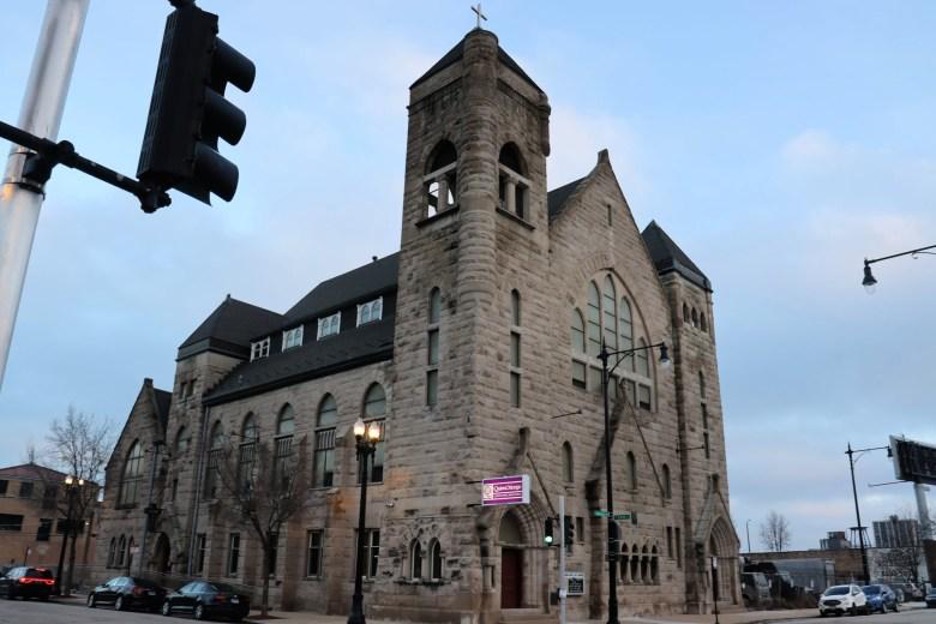Redemption From Hell
By Rev. Jazmine Brooks, Contributing Writer
We believe in God embodied, living among us, crucified, and rising again from death. From the birth of Jesus to the Resurrection, to believe in Jesus as God’s son and as a symbol of redemption is to have a radical faith. We have radical faith. It is not unlike the faith of our ancestors who, only knowing enslavement on American soil, did believe in the abolition of slavery and the eradication of Black suffering at the hands of the state. It is not unlike the faith of Angela Davis, Ruth Wilson Gilmore, and Mariame Kaba who have historically and presently called for the abolition of prisons and police.
Oftentimes, oppressive governmental structures are the impetus for deviation from legal conformity. Selling loose cigarettes (Eric Garner) and burned CDs (Alton Sterling) or making a purchase with counterfeit bills (George Floyd) are human responses to economic deprivation. To run away or respond in angst to being approached by agents of the ruling class is a human response to political disfranchisement and the redundant miscarriage of justice. America has criminalized human responses to social, economic, and political persecution. Though sociological in one form, these non-redemptive systems have very real theological implications because they are reflective of the fire and brimstone theologies that condemn us to eternal suffering for succeeding at being human.
Yet, we are not criminals. Our desire to survive has simply been criminalized by the same system that manufactured our need to survive. We are extensions of God’s spirit, as are all of God’s creation, made in the image and likeness of God. We are inherently good. This criminalization of Black survival, however, was born out of eurocentric theologies of crime and punishment. It is not the witness of Jesus. We believe that Jesus was a revolutionary prophet who dared to challenge the socio-political order of his time with a message of love. Jesus’ life condemned the state that lynched him. Jesus’ Resurrection, therefore, is God’s redemptive work.
Said differently, Calvary’s hill is the place where agents of the state lynched a revolutionary. We are not, therefore, redeemed by a one-time proclamation of faith nor a continued process of personal sanctification. We are redeemed instead in our co-commission with God, fueled by the power of the Holy Spirit, to be the divine encounter that Jesus was in his lifetime. Jesus brought in from the margins those who had been thrown away by their community and made them evangelists. He took the shepherds and fishermen—menial laborers—and made them disciples. These were the victims of economic depravity in the first century. For free, he healed those without healthcare and fed the 5,000 living in a food desert. That work was redemptive. When the curtain closed on Calvary’s hill, it appeared that the hope of redemption had been lost. The revolutionary had been lynched; but on the third day, the empty tomb was there to prove God’s redemptive power, over and against the powers of the state.
Jesus came that we might have a life but the mass production of hell is robbing us of that abundance. Hell is a contrived system and theology of control through violent, dehumanizing retribution. It is fueled by an anti-Christ theology and is the place that preachers and religious pundits send the irredeemable. Hell underwrites the existential crisis that blots out the gift of God’s spirit inherent in all of God’s creation. It is isolation; physical torment; social, political, and economic disenfranchisement; and the wedge between families and communities of support. America and the American criminal (in)justice system is hell. As followers of Jesus, we demand that all of God’s children be redeemed from manufactured hells that God never intended for us to be condemned to in the first place.
We must begin to think more critically about condemnation, grace, and redemption in the cross. Though a world devoid of hell requires a radical reimagining, there is precedence for this imagination. We stand within a lineage of believers who understood redemption as the radical reclamation of our divinity and humanity. That lineage begins in Jesus’ declaration that we might have life and have it more abundantly. That declaration was internalized by our ancestors who, even under the harsh whips of chattel slavery, were convinced that freedom was their God-given right. They are not much different from those who struggled against Jim Crow laws and those who fight for our collective liberation today.
If we believe in redemption, we do not need systems of retribution. We must do away with hell in all of its variations—fire and brimstone in the afterlife, hunger and poverty in this life, homelessness, state-sanctioned violence, capitalist exploitations, colonialism and neo-colonialism, and imperial pursuits—and that includes prisons and police. Hell can neither be reformed nor redeemed.





